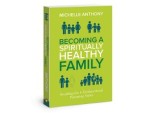I have been so blessed to share about the ups and downs of marriage alongside some men who deeply love the Lord lately. One thing has become clear through this journey. Many men fear that their imperfections in marriage or parenting disqualify them from being considered “godly.”
If faith is important to a man, his wife pays him the biggest compliment when she tells him he is godly despite his imperfections. This single affirmation communicates to him that despite his – often hurtful – actions he remains “enough.”
 The deceptive anthem that inhibits men from living fully from their hearts says, “You have little to offer your family spiritually unless you get it all together.” For some men, the fear of being seen as hypocritical for trying to impart faith in their home while at the same time having a temper, being prideful, lusting after a woman, or giving into workaholism shackles them to a lie of never-ending shame.
The deceptive anthem that inhibits men from living fully from their hearts says, “You have little to offer your family spiritually unless you get it all together.” For some men, the fear of being seen as hypocritical for trying to impart faith in their home while at the same time having a temper, being prideful, lusting after a woman, or giving into workaholism shackles them to a lie of never-ending shame.
Men, it’s not your love for God or your blameless behavior or your perfect job, wife, house, or kids that makes you worthy. Jesus committed his life to you before you committed yours to him. He did it knowing the heart in which he would choose to live would inevitably feel the weight of the shame for which he died. There in the place where you experience the most shame is the location where he chose to take up residence.
Live from a heart that has been set free by the presence of a resurrected Lord who is not ashamed of what he finds tucked away, hidden from the rest of the world.
You are enough for him.
Your heart is good enough.
~JK
 He was hurt and in his hurt he needed help. He needed to know he was going to be taken care of. He needed to know that the pain was not going to last forever.
He was hurt and in his hurt he needed help. He needed to know he was going to be taken care of. He needed to know that the pain was not going to last forever.

